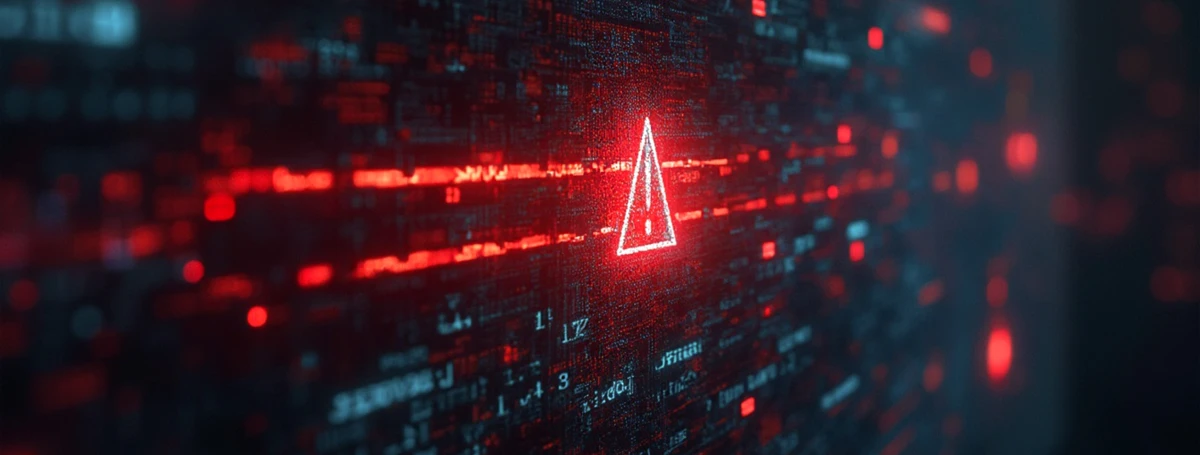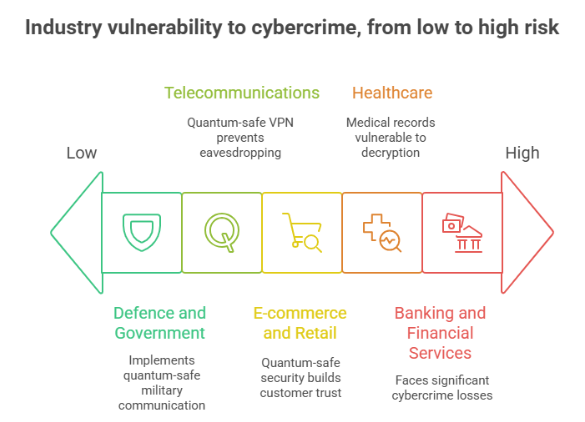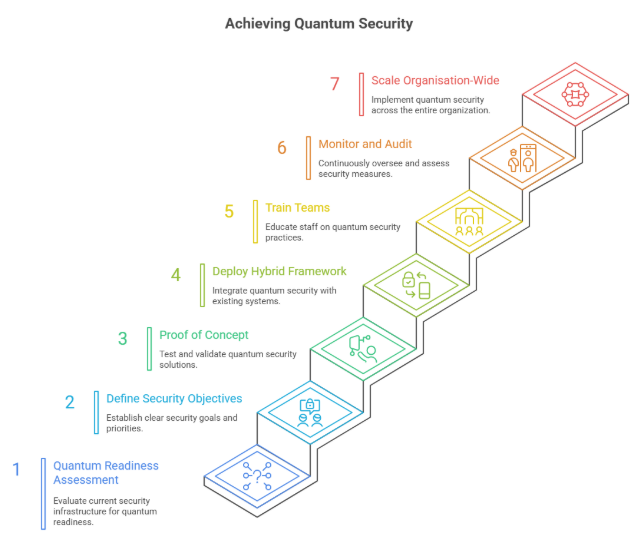Are You Ready to Witness the Future of Data Security?
Platform
©2025 QuNu Labs Private Limited, All Rights Reserved.

₹195 million. This is the estimated cost to the average Indian company after a data breach in 2024—a 39% increase from 2020.
If you are a CISO, CTO, or other business leader, here's what you need to know. India's new data protection law enforces stringent security requirements, and meanwhile, a quantum computer is quickly approaching the possibility of breaking every encryption you may have protecting your systems. The Digital Personal Data Protection Act (DPDP Act) bacame a law in August, 2023. Companies now face penalties up to ₹250 crore for failing to protect personal data. Simultaneously, Google researchers have made estimates that the common RSA-2048 encryption that protects most of your data will be broken within approximately a week with the availability of 1 million quantum bits. The timeline? 2026. This is not science fiction; this is reality tapping at your door.
Think of the DPDP Act as India's GDPR moment. Signed into law on 11 August 2023, it gives people control over their digital personal data whilst setting strict rules for organisations that collect it.
Cybersecurity incidents in India jumped from 10.29 lakh in 2022 to 22.68 lakh in 2024—a staggering 120% increase. Cybercrime losses across sectors are projected to hit ₹20,000 crores in 2025, with banking and financial services facing ₹8,200 crores, followed by retail and e-commerce at ₹5,800 crores.
The government released draft rules in January 2025. Organisations now have 72 hours to report breaches to the Data Protection Board and notify affected individuals "without delay.
But here's what most companies miss: only 16% of Indian consumers understand the DPDP Act, and only 9% of organisations report comprehensive understanding. Yet compliance isn't optional.
The DPDP Act imposes penalties up to ₹250 crore for breach-related violations caused by inadequate security safeguards, and up to ₹200 crore for failing to notify breaches.
For perspective, that's enough to shut down most mid-sized firms.
Business email compromise was the costliest root cause at ₹215 million per breach in India, followed by social engineering at ₹213 million and phishing at ₹209 million.
Now imagine quantum computers unlocking every encrypted file you stored. The financial impact? Incalculable.
The DPDP legislation states "reasonable security safeguards," which ensure unauthorized access to your data does not occur; however, if your data is not protected by a compliant encryption method when a breach happens, it doesn't matter that you did everything right when setting it up.
Can you argue your security was "reasonable" if you ignored a known Harvest Now, Decrypt Later threat? The Data Protection Board won't care that quantum computers weren't widespread when the breach happened. They'll care that you knew the risk existed and did nothing.
Business email compromise was the costliest root cause at ₹215 million per breach in India, followed by social engineering at ₹213 million and phishing at ₹209 million.
Now imagine quantum computers unlocking every encrypted file you stored. The financial impact? Incalculable.
Here's the hidden crisis: attackers are stealing your encrypted data today with plans to decrypt it tomorrow using quantum computers.
By 2034, there's between a 17% and 34% chance that a cryptographically relevant quantum computer capable of breaking RSA 2048 in 24 hours will exist, with probability increasing to 79% by 2044.
But you don't need to wait for 2026 to worry. Nation-states and cybercriminals are conducting "harvest now, decrypt later" attacks right now. They intercept encrypted traffic today and store it. When quantum computers mature, they'll unlock everything.
Think about that. The customer data you encrypted last year could be sitting on a server in another country, waiting.
In May 2025, Google researcher Craig Gidney estimated that “a 2048-bit RSA encryption key will be factored in under a week by a quantum computer with fewer than one million noisy qubits.” That's a 20-fold reduction from earlier estimates of 20 million qubits.
IBM's Condor processor has 1,100 qubits, and Google's Sycamore has 53. We're not there yet, but the gap is closing fast.
Some experts believe quantum decryption capabilities could arrive by 2026, whilst MITRE estimates RSA-2048 encryption unlikely to break before 2055-2060. The range is wide. The uncertainty is high. But one thing's certain: migration to quantum-safe systems takes years.
If you wait for certainty, you'll be too late.
Banking and financial services face ₹8,200 crores in cybercrime losses projected for 2025. Every transaction, every KYC record, every credit score, all vulnerable if encryption breaks. QShield platform provides quantum-safe security for financial transactions, ensuring compliance with both DPDP Act and RBI cybersecurity directives.
National security depends on secure communications. In 2024, QNu delivered 25 QKD systems to the Indian Navy, demonstrating that quantum-safe military communication isn't future tech—it's operational today.
Medical records have lifelong value. Over 100 million records leaked in India in recent years, exposing sensitive information like Aadhaar numbers, financial details, and medical history. Patient data encrypted today could be decrypted in 2045 and used for blackmail, insurance fraud, or identity theft.
34% of data breaches in India involved data stored on public clouds and 29% across multiple environments. Telecom companies aren't just at risk—they're the infrastructure everyone depends on. QNu's quantum-safe VPN and secure tunnel solutions prevent eavesdropping completely, keeping data integrity intact.
Retail and e-commerce face ₹5,800 crores in projected cybercrime losses for 2025. Customer trust is your business model. Lose that, and revenue collapses. 44% of consumers are willing to pay higher if their data is protected. Quantum-safe security isn't a cost—it's a competitive advantage.
In August 2024, the National Institute of Standards and Technology released the first three post-quantum cryptography standards: CRYSTALS-Kyber for key encapsulation, CRYSTALS-Dilithium for digital signatures, and FALCON for authentication.
These aren't theoretical. They're ready for deployment.
In March 2025, NIST also approved HQC as a backup encryption standard, ensuring cryptographic diversity and resilience.

QKD uses quantum mechanics to distribute encryption keys securely. If someone intercepts the key, quantum mechanics generates detectable interferences—you know immediately.
It's physics-based security. No mathematical complexity. No brute-force attacks. Just the laws of nature.
Traditional random number generators use predictable inputs. They're deterministic. They repeat patterns.
QRNGs use quantum fluctuations to generate truly random numbers. Quantum physics is fundamentally random—confirmed by theory and experimental research. This eliminates predictability in key generation.
PQC relies on mathematical problems quantum computers struggle to solve, such as lattice-based cryptography. These can be implemented in software, making them accessible without hardware changes.
Most companies talk about quantum security. QNu Labs has been deploying it since 2018.Founded in 2016 at IIT Madras, QNu Labs is India's first and only quantum cryptography company. Whilst global companies advance quantum security, QNu Labs won the iDEX Open Challenge 2.0 in 2022, successfully developing a 150-km QKD system with trusted nodes and completing trials with the Army.
In 2024, QNu delivered 25 QKD systems to the Indian Navy, marking a significant milestone in quantum secure communication in India.
This isn't vaporware. It's deployed technology protecting India's armed forces right now. QNu offers three cutting-edge quantum-safe products: Tropos, a Quantum Random Number Generator positioned as the new "Root of Trust" commercialised with delivery to DRDO and the Indian Army; Armos, a Quantum Key Distribution solution delivered to a Middle Eastern client, Defence PSU BEL, the Indian Navy, and the Indian Army.
QNu's QShield combines QKD (information-theoretic security), QRNG (unpredictable keys), and PQC (scalable authentication) on one platform:
Tropos (QRNG): True randomness for "Root of Trust"—deployed with DRDO and Indian Army Armos (QKD): Instant eavesdropping detection—delivered to Indian Navy, Defence PSU BEL QShield Platform: QConnect VPN (Crystals-Kyber 1024), QVerse messaging (self-destructing, on-premise), encryption APIs, secure file sharing
Networks tested beyond 1,000 km with crypto agility, SDN routing, and module upgrades. Transition gradually without disrupting operations.
Based on 300+ km quantum networks for India's borders and 25 QKD systems protecting the Indian Navy, here's the proven framework:

The DPDP Act rules are being finalised. Cybersecurity incidents jumped from 10.29 lakh in 2022 to 22.68 lakh in 2024. Quantum computing advances monthly.
The question isn't whether quantum-safe security will become mandatory. It's whether you'll implement it before or after a breach.
Only 16% of consumers understand the DPDP Act, and only 9% of organisations report comprehensive understanding. But lack of understanding won't protect you from penalties or breaches.
Businesses implementing robust data governance now will gain competitive edge. Those who wait will spend years—and millions—playing catch-up.
The UK NCSC suggests 2028 for completing cryptographic inventory and 2035 for full migration. That's 10 years from now. But quantum threats don't wait for your migration timeline.
The intersection of data protection regulation and quantum technology isn't coming. It's here.
Selected as one of the startups under the National Quantum Mission, QNu Labs aims to build and deploy the world's first end-to-end quantum-safe heterogeneous network that is Made in India, Made for the World.
Whether you're a CISO worried about compliance, a CTO planning infrastructure upgrades, or a CEO thinking about competitive positioning, the message is clear: quantum-safe security isn't a future problem. It's today's strategic imperative. Contact QNu Labs to safeguard your critical assets.
The Digital Personal Data Protection Act (DPDP Act) was signed into law on 11 August 2023, giving Indian citizens control over their digital personal data whilst setting strict obligations for organisations that collect it. The government released draft rules in January 2025, requiring organisations to report breaches within 72 hours to the Data Protection Board. Learn more about India's DPDP Act framework.
The DPDP Act imposes penalties up to ₹250 crore for breach-related violations caused by inadequate security safeguards, and up to ₹200 crore for failing to notify breaches. With average data breach costs in India reaching ₹195 million in 2024 (39% increase since 2020), penalties can shut down most mid-sized firms. Read the IBM Cost of Data Breach Report 2024 for detailed India-specific statistics.
"Harvest Now, Decrypt Later" is a cyberattack strategy where threat actors steal encrypted data today with plans to decrypt it using future quantum computers. By 2034, there's a 17-34% chance of cryptographically relevant quantum computers breaking RSA-2048 encryption in 24 hours, increasing to 79% by 2044. Nation-states are intercepting encrypted traffic now and storing it. Learn more from the Global Risk Institute's Quantum Threat Timeline Report.
In May 2025, Google researcher Craig Gidney estimated that RSA-2048 encryption could be factored in under a week by a quantum computer with fewer than 1 million noisy qubits—a 20-fold reduction from earlier estimates of 20 million qubits. While MITRE estimates RSA-2048 unlikely to break before 2055-2060, the UK National Cyber Security Centre recommends completing cryptographic inventory by 2028 and full migration to post-quantum cryptography by 2035. View NIST's Post-Quantum Cryptography Standards released in August 2024.
Post-quantum cryptography uses mathematical algorithms that quantum computers struggle to solve, such as lattice-based cryptography. In August 2024, NIST released three standards: CRYSTALS-Kyber (key encapsulation), CRYSTALS-Dilithium (digital signatures), and FALCON (authentication). In March 2025, NIST approved HQC as a backup standard. These can be implemented in software without hardware changes. Explore the algorithms at PQ-CRYSTALS official site.
Five industries face the highest impact:
Read PwC India's DPDP Act Survey for sector-specific analysis.
QKD uses quantum mechanics to distribute encryption keys securely. If someone intercepts the key, quantum physics generates detectable interferences—alerting you immediately. It's physics-based security with no mathematical vulnerability to brute-force attacks. QNu Labs deployed 150-km QKD systems for the Indian Army (2022) and 25 QKD systems to the Indian Navy (2024). Learn about QNu Labs' Armos QKD solution.
Unlike traditional random number generators that use predictable inputs and repeat patterns, QRNGs use quantum fluctuations to generate truly random numbers. Quantum physics is fundamentally random—eliminating predictability in encryption key generation. QNu Labs' Tropos QRNG is deployed with DRDO and the Indian Army as the "Root of Trust" for security systems. Discover more at QNu Labs' Tropos page.
Founded in 2016 at IIT Madras, QNu Labs is India's first and only quantum cryptography company. Selected under the National Quantum Mission, they offer:
Visit QNu Labs official website.